(Bloomberg) — The downward spiral of Chinese tech stocks shows no signs of abating, with alarms now ringing in the options market.
Even after a drop in market value of almost $2 trillion, investors are seeking hedges against further losses in the Hang Seng Tech Index. Bearish options on the benchmark are trading near a record premium above bullish calls as the gauge plunged this week, data compiled by Bloomberg shows.
The tech index has plunged 61% from its peak last year. The Nasdaq Golden Dragon China Index of U.S.-traded stocks has fared even worse, down 68%, and with another bad day or two, the peak-to-trough decline could surpass its 72% crash in the 2008 global financial crisis. But for many investors, overwhelmed by renewed regulatory and earnings shocks and Russia’s invasion of Ukraine, the shares aren’t cheap enough yet.
“The market is very panicky,” said Paul Pang at Pegasus Fund Managers Ltd., who has sold almost all his stake in Alibaba Group Holding Ltd. “Sanctions against China are not impossible, if China refuses to take sides on the war in Ukraine. Tech shares are among those risky names exposed in the crossfires in the rising Sino-U.S. tensions.”
Chinese tech shares are particularly vulnerable in an environment where investors are shunning risk. On Thursday, Chinese stocks in the U.S. suffered their biggest selloff since 2008 after U.S. regulators identified five companies that could be subject to delisting for failing to comply with auditing requirements.
Moreover, fear of a fresh regulatory crackdown by Beijing has escalated lately as policy makers proposed more curbs on online games. Earnings results so far have been unable to ease any worry about the growth outlook amid weakening consumer demand in China.
The Hang Seng Tech Index is the one of the world’s worst-performing tech gauges since the war in Ukraine broke out and has dropped 17% in March, on course for its biggest monthly drop ever.
To be sure, some investors have found the buying opportunities following such a drastic rout.
“We see pockets of forgotten stocks in China’s internet sector following the regulatory cycle of 2021,” said Ernest Yeung, a portfolio manager at T. Rowe Price Group Inc. “History tells us that the negative impact from previous bouts of regulation and reforms on Chinese equity performance has been short term in nature.”
Primavera’s Fred Hu Says China Stocks Selloff Is ‘Excessive’
But so far, the fears still prevail. The cost of put contracts for video-streaming operator Bilibili Inc. and delivery giant Meituan has jumped to near the highest since at least July, Bloomberg data shows.
Tech Chart of the Day
Thursday marked the anniversary of the peak of the dot-com era, after which some of the market’s then-biggest names began a collapse they would take years to recover from. The Nasdaq Composite Index hit an intraday peak of 5,132.52 on March 10, 2000, before going on to lose 78% of its value and finally bottoming in October 2002. It wouldn’t recover its former peaks until mid-2015.
Top Tech Stories
- Oracle Corp. gave an upbeat forecast for its cloud-computing business, helping its shares recover from a decline in extended trading after the company reported disappointing quarterly profit and slowing growth in its corporate finance applications
- Meta Platforms Inc. and Alphabet Inc.’s Google face European Union and U.K. antitrust probes into possible collusion over the way they operate online display advertising services.
- The campaign to starve Russia of technology — stripping the nation of everything from iPhones and Airbnb listings to defense electronics — is an unprecedented experiment that risks pushing Vladimir Putin further into China’s orbit.
- Didi Global Inc. has suspended preparations for its planned Hong Kong listing after failing to appease Chinese regulators’ demands that it overhaul its systems for handling sensitive user data, according to people familiar with the matter
More stories like this are available on bloomberg.com
©2022 Bloomberg L.P.











